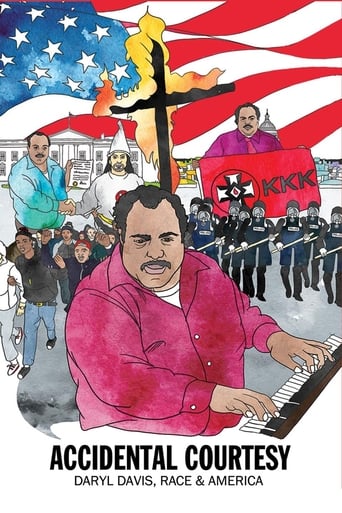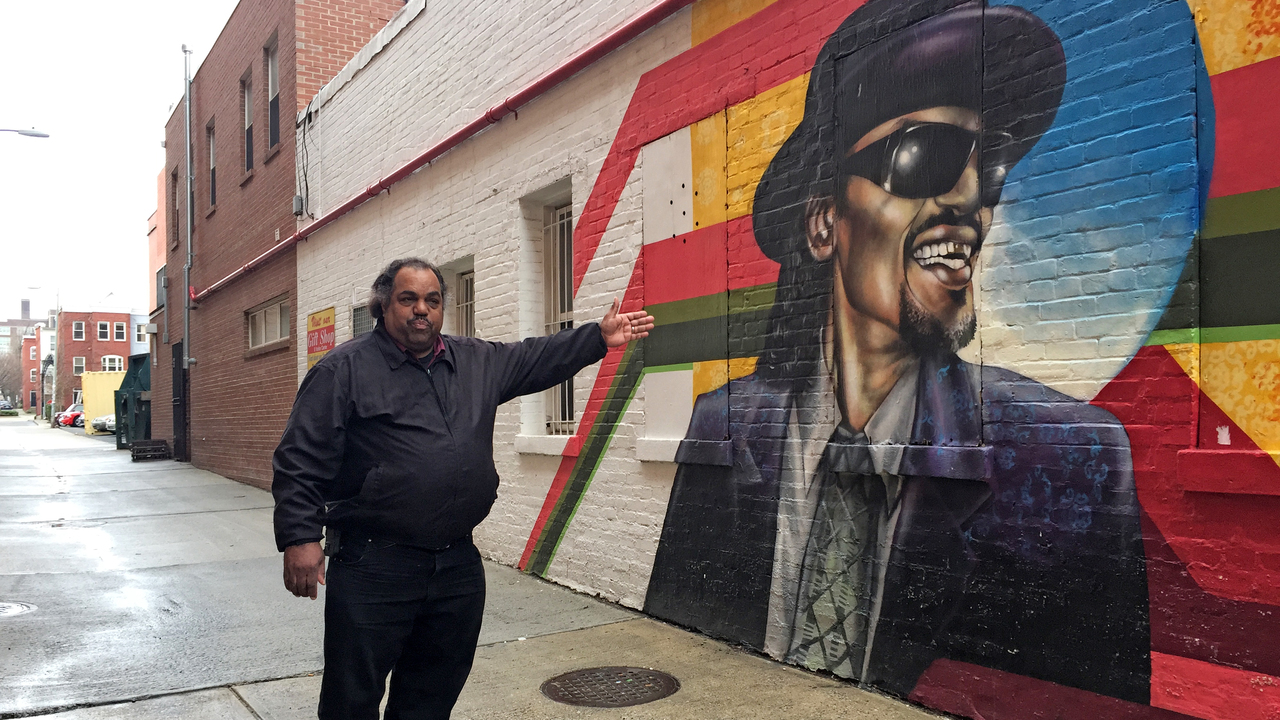Bread-n-Circuses
There really is a war which has gone on and is going on between truth, peace and love vs. lies, war and hate. The struggle is between the light of truth and the darkness, occluding that truth, not relating to skin color in this context. Daryl articulately asks a simple self evident and self answering question something we learned the answer to in grade school. Listen for it. Another reviewer calling Daryl's approach to curing anger between blacks and whites 'simple' as a term of denigration, implying Daryl might be 'simple' and not worth listening to. A good question to ask ourselves might be - Who of all the complexity purveyors in this film are outright making money or at least on another level stoking their ego from their public political position, as a professional advocate of a cause they espouse? Follow the money to find the jive talkers. Buy this film and support a great cause.Daryl is a decent musician, who has played with some true hero's of American music - even showing us some stride piano playing at one point in the film which is very technical. Daryl is not failed at life, like his detractors and frankly like some of the world's most evil demagogues were and are before they rose into whom they became infamous. Daryl is hip, educated, and worth listening to! Is he making money himself from this film? I hope he is. I don't feel shaken down for buying it.
Causekix Picks Flicks
A black musician named Daryl Davis has made it his life mission to dissolve racism. Particularly, he dialogues with White Supremacists, often befriending them and eroding their ideologies through his enduring, authentic relationship. He (and the film makers) also educate through usually unbiased sharing of history. The film also chronicles some of Daryl's story. He's lived a very extraordinary life, having shared the stage with many famous musicians, visiting over 50 nations, and has authored & acted. For most of his life, Daryl has pondered "Why do you hate me when you know nothing about me?" This burning question is his basis. He gives those who hate the color of his skin an opportunity to experience the quality human being that lives and loves from within that skin. He also returns the favor, and respectfully empathizes with his opposition - giving them time and space to express and wrestle with their convictions.
iieeef
Daryl Davis is a serious man with a unique approach to a complicated issue. An accomplished piano player, Davis spends his free time collecting Ku Klux Klan memorabilia in the hopes of one day creating a Ku Klux Klan Museum. Odd enough already for a black man, but his collection is a bit more specific than that. Everything in his collection has been gifted to him by former Klan members who left the Klan after starting a friendship with Davis. So essentially, Davis befriends Klan members in the hopes of humanizing the black experience and collecting their robes, though he would insist there is no agenda and that they are truly his friends. He calls them his friends, he laughs with them. At one point the camera actually catches Davis adjusting the hood of a Klan member as he suits up. While this is perplexing to some people, it is absolutely infuriating to others.Just because the film is examining Davis closely though, do not assume the Director is attempting to sanctify him. Matthew Ornstein does a fantastic job of presenting both sides of a polarizing issue without ever landing the film squarely in either camp. In fact, the most engaging sequence in the film is a heated debate towards the end which reveals the many cracks in Davis's armor, a risky move with a title character so close to the end of the film. But Ornstein seems to know there is standing room on both sides of the issue and he, like the audience, seems to be treading a path back and forth between the two sides. This film may leave you with more questions than it answers, but it is certainly a conversation worth having.
classicalsteve
Probably 95+% of Americans are not racists. However, even though 5% seems like a low number, that means there are about 17 million people living in the United States who not only are racists but many of them see themselves as such. That seems large when written down as a number rather than a percentage. And that 5% can wreak a lot of havoc. Even among those who believe Whites are superior to Blacks/African-Americans, it's an even smaller percentage who engage in crimes. However, it doesn't take many people to target a house or church or murder an "agitator". If 1% of those who are racists are willing to commit crimes to further their cause, that's still 170,000 people willing to risk imprisonment to commit heinous crimes for the sake of perpetuating racist ideas. So the question becomes, how do you speak to these people? Self-proclaimed racists are not going to be easily dissuaded their ideas are not only based on fabrications, they are actually self-destructive.In "Accidental Courtesy: Daryl Davis, Race & America", Daryl Davis has forged a new approach to dealing with the racial problem. While the premise seems so obvious it couldn't possibly work, Davis's strategy entails listening to the "other side", even befriending members of the "other side". So instead of standing on soapboxes and getting into shouting matches which may escalate into violence in urban streets, Davis has done almost the unthinkable: enter their territory and listen to their views. Interestingly, Davis never lets their racist views stand, but he's willing to hear them out. When one racists states he feels Whites are being "invaded" by other races, Davis gently points that at least among African-Americans, they were brought to America by force by Whites, implying the "invasion" was at the very least originally created by Black slavery. Strangely, many White Supremacists have taken to Davis and have even called him their friend.At the beginning of the documentary, Davis is shown offering a lecture about the racist dilemma. He says that often people who wish to end racism in America simply get together among-st themselves and discuss about how bad racism is, but as well-intention-ed as these groups are, they are ineffective because they're only preaching to the choir. He suggests that anti-racists need to engage with racists to open a dialogue. Davis, similar to comedian W. Kamau Bell on CNN, has entered into KKK and other White Supremicist locations and conversed with them, willing to listen to their side to understand why they feel the need to engage in a race war. He finds there's a wide range of attitudes, from those who desire the destruction of other races to those who believe a separation of the races is the answer.Davis' mantra is "If they're talking, they're not fighting" which I interpret as "if the racists are engaged in a dialogue, at least they are not engaged in violence". Through his friendships, Davis has been able to persuade a number of hardcore racists that their views were based on erroneous information and their attitudes could lead to behavior which is ultimately self-destructive. Although these changes of heart don't happen over night, it seems over a period of friendly dialogue, Davis has been able to turn a not insignificant number of racists, some of whom were leaders of their groups. One of Davis' codettas after "turning" a racist is to request the newly reformed to give him his/her KKK uniform if they were part of the Ku Klux Klan. Davis then hangs the uniform in a kind of museum which celebrates his battle against racism. Why I think Davis' strategy has a lot of merit is simply because he believes racism itself is the enemy and not the racist.I contrast Davis' approach to that of W. Kamau Bell on a CNN series called "United Shades of America". While I applaud both men for risking their lives to enter enemy territory, Davis' goals appear more concrete. I watched a few episodes of Bell engaging in similar friendly infiltration but I never got a sense of what Bell was trying to accomplish except making some jokes about racism, convincing them that African-Americans are for the most part "harmless", and watching them engage in KKK rituals. By contrast, Davis' goals are very clear: he wants to make friends with racists which may in turn lead to their questioning their racism. At the end of the documentary the quote by Lincoln succinctly sums up his approach: "Do I not destroy my enemies when I make them my friends?"Simultaneously, Davis has had his critics. The most virulent came from a fellow African-American who wouldn't shake Davis' hand because he felt he had "sold out" African-Americans by befriending racists. Even a White intellectual in pursuit of destroying racism was questioning Davis' approach because he felt it would take "too long". One of the other eye-openers is that Davis learns that a racist who has "turned" away from racist sensibility becomes even more vilified by the racists than even those of the other races! Considering that we've had civil rights legislation for 50 years, we still have a long road ahead before racist sensibilities are completely eradicated. Rather than just making speeches on soapboxes as has been the typical approach, Davis is willing to travel the roads to Racism, USA, and see if there is a way to make peace by offering alternative paths.


 AD
AD
